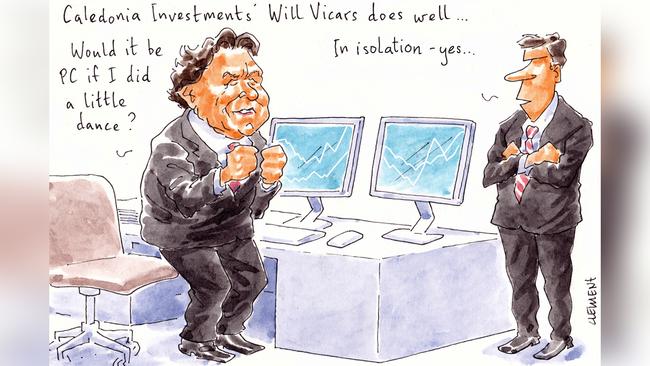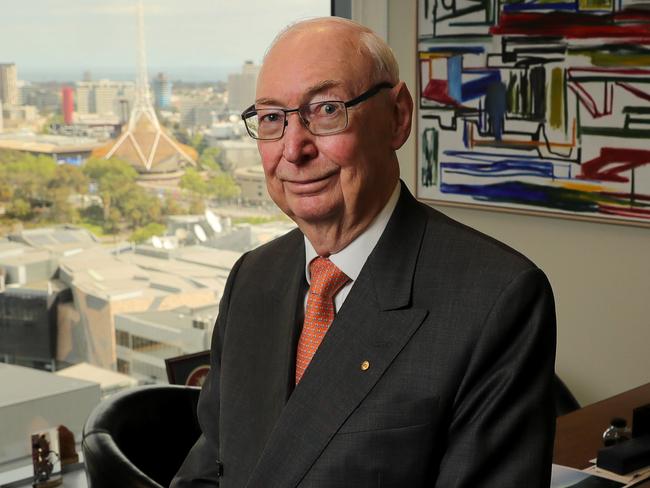Bad news for Cormack’s Charles Goode on bank dividends

The Liberal Party will be pleased that the next federal election is still a couple of years away, given the recent sharemarket impact on the Charles Goode-led Cormack Foundation, the party’s biggest donor.
The foundation’s war chest is dominated by a 12-stock portfolio of blue-chip shares. In normal times it has shown consistent capital growth and generated millions in dividends that are donated to needy candidate campaigns across the country. That’s after payments are approved by Goode’s board, which includes former PM John Howard and former Victorian senator Richard Alston.
The problem, however, is that its share pile is dominated by the big four banks, whose share prices and dividends have been smashed due to fallout from the coronavirus pandemic.
In 2018-19 (which included the last federal election), the four pillars contributed more than $2.1m in dividends to Cormack, which was then able to flow through to the party.
Australian Electoral Commission disclosures indirectly reveal it has 126,608 ANZ shares, 266,000 CBA shares, about 292,000 NAB shares and about 105,000 NAB shares.
Since the end of February, losses on the four banks has stripped almost $10m from the value of the Cormack portfolio.

Its bank shares are worth just under $26m now, from about $36m just over two months ago.
Income that Goode and his directors might have expected to flow into Cormack from the first half have been smashed, too.
Westpac chief executive Peter King this week revealed that the bank had decided to defer its 2020 interim dividend, with no June payment. That was from the dividend of 94c a share previously that netted just under $100,000.
The dividend from Shayne Elliott’sANZ has been deferred too, with no update until August. That’s from 80c a share from Goode’s old shop for the most recent interim, which pumped just over $101,000 into the coffers.
NAB’s Ross McEwan has slashed his interim dividend down to 30c, from 83c at the end of the previous first half, so about $90,000 will be paid to Cormack rather than $250,000 previously.
Thankfully, CBA announced its dividend for the six months ending December 31 back in February, before we had any idea of how the international health crisis would play out.
Matt Comyn’s dividend was steady at $2 for a total of $532,000 for Cormack.
The Cormack portfolio also has the likes of Argo, BHP, Rio Tinto, Transurban, Wesfarmers and Woolworths, the later of which is really the only of those to have done relatively OK.
Vicars in the money
Fund manager Will Vicars looks to have got some bang for his buck after telling clients six weeks ago that the sharemarket correction had given his Caledonia Investments the chance to buy “nearly $2bn of shares” in late March.
The latest set of numbers sent to clients shows the firm’s flagship Global Fund rebounded from its 14 per cent slump in March — which was only a tad below the MSCI index performance — to be up 17 per cent in April.
For the financial year to date, the fund is up almost 27 per cent after fees, after it has also been helped by the low Australian dollar given its unhedged positions. Caledonia’s combined strategy performance of its Global Fund and its Global Co-Invest fund was up 18 per cent in April, compared to the MSCI’s 10 per cent gain. That was a rebound from the 22 per cent fall in March.
Caledonia has 25 per cent of the money invested in US online real estate group Zillow, alongside local billionaire Gretel Packer, who has around 2.3 per cent of the Nasdaq-listed company after her brother James transferred her the shares as part of a $1.25bn settlement of their father Kerry Packer’swill in 2015.
GrubHub, another Caledonia US investment, has enjoyed the online home-delivery bonanza driven by the coronavirus lockdown. Its shares are up from $US30 in March to $US45 on the New York Stock Exchange.
Perhaps their most surprising performer has been their $3bn in Canadian online gaming firm The Stars Group, which last year merged with Flutter Entertainment, which is best known as the owner of bookmakers Paddy Power and Betfair. Revenue from poker play has doubled during the lockdown with casinos shut across the world. Shares in Stars have doubled on the Nasdaq since mid-March.
Wheels come off
There’s always a backstory when it comes to the collapse of an enterprise, and in the case of Sydney arts hub Carriageworks the yarn may have something to do with Gladys Berejiklian.
The Redfern not-for-profit cultural institution was placed into voluntary administration and the hands of Phil Quinlan and Morgan Kelly from KPMG on Tuesday due to the impact of the global pandemic.
The Cass O’Connor-chaired Carriageworks has been closed since March 23, following restrictions imposed on public gatherings by the Scott Morrison-led national cabinet, which also includes the NSW Premier.
Margin Call gleans that Matt Comyn’sCommBank is a secured creditor to the arts organisation, whose directors also include Herbert Smith Freehills partner Michael Gonski, the son of David Gonski. Citi chair Sam Mostyn and crisis management consultant Sue Cato have both dodged the unfolding financial crisis after they exited the Carriageworks board in December, given the expiration of their maximum two terms. Two corporate heavy hitters had been lined up to take their places, but were awaiting the tick from Berejiklian’s people.
Carriageworks is a rare arts beast as it generates about 75 per cent of it receipts from commercial operations, including the likes of Sydney Contemporary, Mercedes-Benz Fashion Week and the Sydney Writers’ Festival. It also runs regular farmers’ markets, which break even at best.
And here’s where the state government’s role in the unfolding saga appears to play out. The government funding is officially payable at calendar year end, but traditionally paid in July or August. Given the financial pressures that the COVID crisis is placing on the state budget, the powers that be at Carriageworks have been told that moneys won’t be coming early this year — perhaps not realising that would leave corporate adviser O’Connor and her board colleagues facing the prospect of Carriageworks trading while insolvent.
Hence their move to hand over the reins to KPMG and buy some financial breathing space.
Billions down under?
The offer of a seat on the Keybridge Capital board to veteran funds manager Geoff Wilson has been revoked after it went unresponded last month.
So no big surprise, amid the deteriorating relations, that the Nicholas Bolton-led financial services firm has copped yet another takeover bid from Wilson’s Wilson Asset Management.
Keybridge has again suggested its shareholders take no action in the ongoing war of attrition between Wilson and Bolton, which has seen the occasional intervention of the Takeovers Panel.
The latest bid is the third time WAM Active has lobbed a bid at 6.9c a share.
Their first of four offers nearly 12 months ago was at 7.5c. There was also a brief skirmish in 2016, when Wilson proposed a restructure rather than a formal bid.
“I think Geoff Wilson might be obsessed with me”, the longtime controversial corporate raider Bolton told Margin Call.
“It’s quite a compliment, actually — it seems he follows me into almost everything I invest in.
“Keybridge makes up less than 0.1 per cent of Geoff’s portfolio, yet probably more than half of his time at the moment,” Bolton suggested.
WAM Active advised in March its voting right extends to 45 million shares, which reflect 25 per cent of the suspended ASX-listed company shares.
Meanwhile, Keybridge has just welcomed regional newspaper mogul Antony Catalano to the share registry and board, after Catalano invested $1.3m in Keybridge that secured just over 10 per cent through his super fund.
It would all be worthy of a documentary series, Margin Call reckons, or even a Billions-style down under drama with the right casting.



To join the conversation, please log in. Don't have an account? Register
Join the conversation, you are commenting as Logout